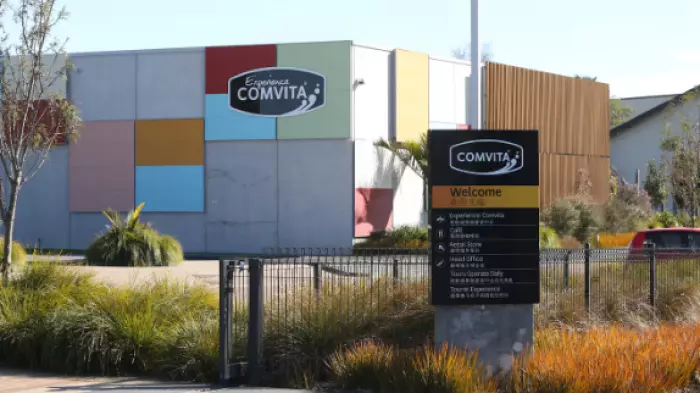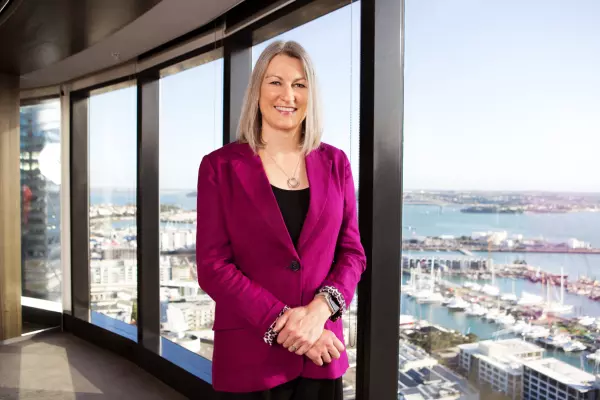BusinessDesk's investment editor, Frances Cook, responds to readers' emails on a weekly basis to answer various questions about money. Below you'll find her expert advice on a subject she's extremely passionate about.
Hi Frances,
I hope this email finds you well.
I have been following your Tiktok account because I am interested to learn about managing my finances. I have also bought your book but I have not started it yet. But I am excited to start reading it.
Just a query about an investment. I am currently doing forex and I am with a broker but unfortunately due to what has been happening around such as the war and spike of gas prices my trading account is not doing well. I have lost a big amount of money.
Just wondering if you know someone who’s also doing this kind of trading? Just wanting to learn more about it and if I am even making the right decision of putting my money into it (which I think is not?)
If you could please provide some insights about this?
I am really into investing my money in platforms that will make profits. Also, I am looking into another investing company that seems legit. What would be your perception in regards to this?
Thank you so much for your time, Frances.
N
Hi N,
It’s fantastic that you’re interested in managing your money and learning to invest, but you certainly have jumped straight into the deep end! Forex, or foreign exchange trading, is a really risky investment that even experts can lose lots of money on.
For those who haven’t come across it before, forex trading is buying and selling foreign currencies, betting on the changing value of the currency in order to make a profit. In order for one person to make money, someone else has to have lost. This is different from other types of investment, such as shares, where a business makes a profit and shares it with you. Nobody else needs to have lost money in that scenario.
I’m worried about this broker you say that you’re working with. You say that you’ve lost a big amount of money, but don’t mention how much that is. The broker shouldn’t be encouraging you to continue with something that, so far, doesn’t seem to be working well. Most advisers I’ve met also wouldn’t encourage someone to go for forex as their main strategy. Standard advice would be to have a smaller percentage of your investing money in something that is risky and have a larger portion in proven investments like shares or property.
Is this broker registered in New Zealand (or whichever country you’re based in), and accredited as a financial adviser? You can check on the Financial Services Provider Register here.
If they’re not, I would run, not walk, away from them.
You mention two different platforms in your email, both of which seem to be based overseas. I've removed their names from this column because I would be extremely cautious about investing through these platforms, and personally, I wouldn’t do it.
When you invest through overseas websites or platforms, you don’t have anyone to help you if things go wrong. Fraud, scams, or just mistakes, happen all the time in investing. When that happens, you can report them to places including the Financial Markets Authority, or NZ Police.
Except, they only have powers within NZ. If your money has gone overseas, nobody can help you. That is a huge drawback.
You mention that your gut instinct is that you maybe shouldn’t be investing in forex. If you are feeling this way, that’s a big red flag. There are so many good investments that make solid profits, that don’t require you to take this much risk.
I hope this isn’t too discouraging. It’s great that you’re taking an interest in money, and I hope that reading my book also gives you ideas of other solid investments that can help you achieve your financial goals. If you’ve started reading it by now, you’ll know that I’m a big fan of investing in shares. I think something like that might be a better way for you to start your investing journey.
Get more info when you listen to Frances Cook's Cooking the Books podcast here:
Hi, love your work! I’m 68 in June and own a house worth about $800,000. At present, I’m working to supplement my pension and I would really like to retire. I would also like to stay in this house. I have no mortgage and it works very well for me.
I have some savings, but not enough to last me and I hope to keep them for holidays and car costs.
Should I consider a reverse mortgage to supplement my pension so that I don’t have to work? I have nobody to leave my house to and would be quite happy to ‘go’ leaving very little behind.
Some friends are getting a ‘good deal’ from SBS with their Unwind account. Can you recommend any other company?
Thank you for your help,
L
Hi L,
Reverse mortgages can be a great option in some situations but need to be treated really carefully. Here are some pros and cons to think about.
For starters, it’s understandable that you’re looking for a little extra cash to fund your retirement. KiwiSaver has only been around since 2007, so many people in your age group didn’t have an easy way to save and invest. A reverse mortgage can help unlock some of the money that many people funnel into their homes instead.
My main concern is your age. The reverse mortgage works by letting you take out a loan on the value of your house but then continues to charge you interest on that loan, slowly eating away at the remaining value of your property. Not to be indelicate, but for people who are getting towards the end of their life, this doesn’t matter too much.
But let’s say that you have a long, happy, healthy life of retirement ahead of you. I certainly hope so! It could be 30 years or so of compounding interest, and that can blow out the value of your loan big time.
Reverse mortgages are pretty expensive debt. SBS currently offers a rate of 6.35% which is charged monthly, while Heartland offers 6.45%. I’m not sure how much you’re hoping to take out, but for simplicity’s sake, let’s say you take out $100,000 from the value of your house. In 10 years, that debt will be worth $188,400. In 20 years, when you’re 88, it’s jumped to $354,945. If it goes for 30 years, that debt will be worth $668,714.
Those figures look big, but they’re probably a low estimate. The interest rate for a reverse mortgage is usually floating, and we’re entering a period of increasing interest rates. So it could end up being more than that.
This is one reason why the bank will limit how much they lend you based on your age. For instance, you mention the SBS Unwind scheme. It caps how much you can borrow; 15% of your home’s value at age 60, up to 35% at age 80, up to a maximum of 50%. That’s because they want to make sure they can sell your home for more than the debt is worth when the time comes. So if you’re able to wait until you’re older, you’ll be able to get more money out of your home, without spending more of it on interest charges.
A big pro for the reverse mortgage is that in most situations, you don’t have to make any repayments until your home is sold, and they won’t sell your house out from under you. However, you really want to check the fine print on that agreement. Life can happen, and if you need to sell your house for some reason, it can ruin the whole arrangement. When you’re older you might want to move into a retirement village or care, and after selling the house, be left with nothing at all.
If you start a relationship, once you die, your partner will have to move out of the home. You’re also usually not allowed to rent out your home to someone else, or travel and leave it empty for long periods of time. The deal is that you can stay in your home … but you also have to stay in your home.
I also talked to a couple of experts about your situation. Here’s what Financial Advice NZ chief executive Katrina Shanks had to say:
“Reverse mortgages are a consideration in terms of accessing funds which are tied up in your house and are becoming more common. It is more common to have a reverse mortgage for a short period of time.
“Here are some things you should consider:
- The benefit of a reverse mortgage is you don’t have to service the mortgage.
- However, the paperwork is significantly more than a normal mortgage.
- There is the accumulative nature of compounding interest and reducing your equity as you make regular payments.
- Interest rates are normally higher than a normal mortgage.
- If you decide to eventually sell your home and go into a retirement home after a period of time your equity could have reduced significantly.
“The fact that you don’t require any funds to be left behind is a good reason to enjoy your funds now and in the future. 68 years is quite young to be obtaining a reverse mortgage for a long period of time (could be 20 years or more) and could eat into the equity quite quickly after the first few years. This is fine if it is planned for and you have considered if you would need funds for a retirement home in the future if you exit your current home. Seeking the help of a financial adviser to assist you in planning your financial future will give you peace of mind that you understand the funds needed as you progress through different stages of your retirement.”
I also had a chat with Rupert Gough, CEO of Mortgage Lab. He also says the decision will be strongly influenced by your age:
“We get a few reverse mortgage enquiries and they really are an amazing product. The policies that are involved with them help to protect the clients from getting into any trouble. For example, at Heartland Bank (who is our main supplier of them) the LVR that clients can borrow to is their age minus 40%. So a 68-year-old with an $800,000 home could borrow a maximum of $224,000 (28%).
“The team at the bank would then have a discussion about what the money is for and typically prefer to distribute that $224,000 as an income rather than suddenly giving people access to a large sum of money.
“There are other safeguards like protecting clients from going over 50% LVR on their property at any stage and giving the estate 12 months to sell a property after the last owner passes which means the likelihood of anyone ever being underwater is near zero (with the understanding that risk can never be completely zero, but it's pretty close).”
My gut feeling is that a reverse mortgage might be a good idea for you, but once you’re a bit older the compound interest doesn’t have such a big impact.
Until then, could you possibly drop down to working part-time, so that you get more free time but still have some fun money? It’ll be harder to go back to work when you’re older and the aches and pains are building up more, but if you can find an enjoyable part-time job, for now, that might be a good compromise option.
If you’re still keen to make use of the money that you have locked up in the value of your home, there are a few other options you might want to consider. You could sell and downsize, investing the remaining nest egg into bonds, which give a regular payment that you could use for fun money. You could subdivide your section if there’s room. You could maybe bring in a boarder, or AirBnB a room if you don’t want a permanent flatmate.
Personally, a reverse mortgage is something I’d only use at this stage of life once I was sure there were no other good options. You’re absolutely entitled to a good retirement but just check first if another solution could be a fit for you.
Send questions to [email protected] if you want to be featured in the column. Emails should be about 200 words, and we won't publish your name. Unfortunately, Frances is not able to respond to every email received, or offer individual financial advice.
Information in this column is general in nature, and should not be taken as individual financial advice. Frances Cook and BusinessDesk are not responsible for any loss a reader may suffer.















